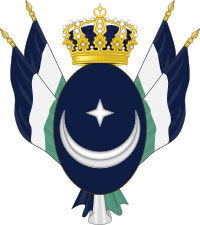Draft:Duchy of Almasía
 | Draft article not currently submitted for review.
This is a draft submission. It is not currently pending review. There are no deadlines as long as you are actively improving the submission. Drafts not being improved may be deleted after six months. Note: The submission-received box will appear at the top of the page. If it's there, your draft has been submitted correctly.
This draft has not been edited in over six months and qualifies to be deleted per CSD G13.
Where to get help
How to improve a draft
You can also browse MicroWiki:Good articles to find examples of MicroWiki's best writing on topics similar to your proposed article. Improving your odds of a speedy review
Last edited by Europaren (talk | contribs) 20 months ago. (Update) |
Duchy of Almasía
| |
|---|---|
Duchy | |
| Country | Empire of Garránia |
| Established | 31 August 2022 |
| Founded by | Shiva Sanría |
| Government | |
| • Type | Duchy |
| • Body | The House of Sanría |
| • Duchess | Shiva Sanría |
| Elevation | 5 m (16 ft) |
| Population (2023) | |
| • Total | ~ 680 |
| 1 citizen as of 2023 | |
| Demonym | Almasíans |
| Time zone | UTC-5 (EST) |
| • Summer (DST) | UTC-4 (EDT) |
| Area Code | (239) |
| Part of a series on |
| Garránia |
|---|
 |
| General |
| Constituent States |
| Government Organizations |
| Online Allies |
The Duchy of Almasía, more commonly known as Almasía, is a member state of the Empire of Garránia. Shiva Sanría was self-appointed as Almasía's leader and on 31 August, 2022. Prior to this, Sanría was a known supporter of Ezekiel Ensor's isolationist ideology.
Etymology
The name Almasía, originates from both the Arabic word for diamond, "almas", and the Spanish word suffix "ía". This is intended to reflect the large number of Arab-Garránians inhabiting the state, many of which who lived in parts of Central America prior to settling in the Empire of Garránia.
History
Almasía was founded during the beginning of Garránia's Isolationist Era. Its Duchess held a strong influence in the Grand Council having argued for Garránia's isolation from the greater micronational community. The province has a large population of non-naturalized immigrants and is known for its cultural diversity, most of which have origins in Central America and the Middle East.

